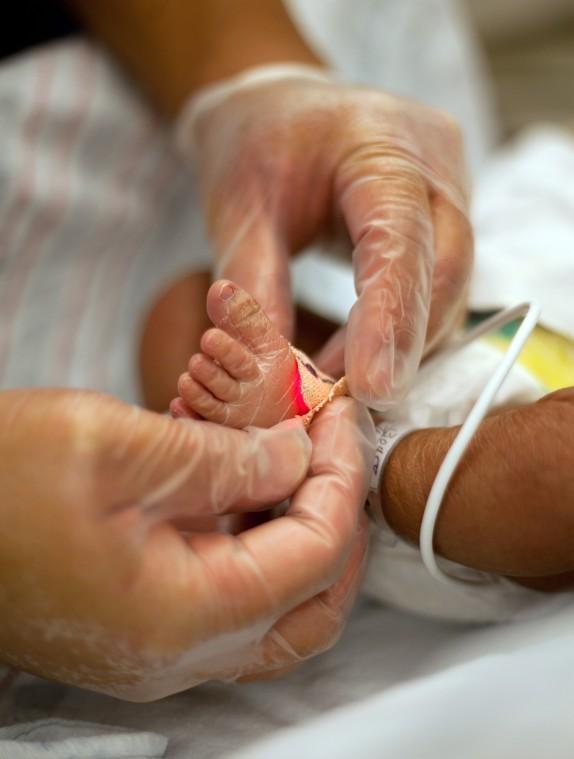Initiatives Aimed at Improving Health Outcomes and Reducing Disparities for the Youngest Patients
The Newborn Coalition today announced its 2012 policy priorities addressing immediate advocacy objectives for leveraging technologies in support of newborn health at the local, state and federal level.
In 2011, the Newborn Coalition focused its efforts on the securing a federal recommendation from the U.S. Secretary of Health and Human Services that all newborns be screened for Critical Congenital Heart Disease (CCHD). Heart defects are the most common of all birth defects, impacting 1 of every 100 infants. The coalition provided key testimony, worked with 4 different federal agencies and provided briefings to more than 75 congressional offices. The recommendation has been endorsed by the American Academy of Pediatrics, the American Heart Association, and the American College of Cardiology.
In 2012, the coalition’s policy goals focus on implementing the Secretary’s recommendation, as well as fostering an environment where innovative and impactful technologies can be applied to increase access to pediatric cardiology services and specialty care while encouraging health IT enabled care coordination for newborns.
“Advocacy is a vital part of our mission, educating and collaborating with the public policy, public health, provider, parent, and legislative communities on key issues that impact the health and well-being of newborns and infants,” said Jim Bialick, Executive Director, Newborn Coalition. “The priorities help us stay on top of immediate needs and track progress in initiatives that address critical challenges in newborn health.”
The priorities are compiled with input from the coalition’s advisory board and expertise from the organization’s numerous partners in the medical, academic, research, and public policy communities. 2012 priorities include:
Federal Advocacy:
- Advocating for high-value policies, standards and legislative language that emphasize solutions for public health reporting of newborn-screened conditions in federal technology programs.
- Working with congressional members to protect and enhance funding for vital public health initiatives, including maternal and child health programs, newborn screenings (Newborn Screening Saves Lives Act), education, outreach, follow-up care, quality assurance and care coordination that improve outcomes and reduce disparities for infants.
- Continuing collaborating with HRSA and federal advisory committees on implementation of routine pulse oximetry screening for CCHD and additional critical newborn public health initiatives.
- Working directly with the Office of the National Coordinator (ONC) to accelerate Health IT standards development and provider adoption of technologies that impact newborn health and outcomes.
- Ongoing direct engagement with the provider, public health and vendor communities to support research, technologies, and programs that improve newborn access to quality care while reducing costs through the use of technologies.
- Reducing barriers to the development, market readiness and deployment of health technologies.
- Convening thought leaders and key decision makers on Capitol Hill and with the Administration to raise visibility and promote the use of technologies in newborn health.
State Advocacy:
- Working directly with states to tailor model-legislation that will create a solid foundation for CCHD screening and reporting, leveraging health IT as a key component of implementation.
- Working with state Departments of Health to assess existing technological capacity and help advocate for appropriate changes that will facilitate scalable results reporting and follow-up.
- Developing executing on health IT-centered pilot projects focused on the development and implementation of a newborn electronic health record; an open-source, online knowledge hub for newborn screening for heart defects; state-based vital statistics repositories; state-readiness implementation roadmaps; electronically integrated SSA newborn disability eligibility; and a newborn critical care and access mapping project.
The Newborn Coalition will also be working collaboratively with federal agencies, national associations and the private sector to initiate additional pilot and demonstration projects to support federal standards and projects aimed at increasing early detection of health conditions, improving care, and accelerating adoption of health technologies.
“Babies in the United States have a higher risk of dying during their first month of life than do babies born in 40 other countries,” said Mary Ellen Mannix, founder of James’s Project, national patient health and safety advocate, and Newborn Coalition Advisory Board member. “Over the past year, the coalition has facilitated an unprecedented level of collaboration with the singular goal of improving the healthcare of newborns and infants. These efforts are already resulting in lives saved and will continue with these priorities in 2012.”
More about the Newborn Coalition
The Newborn Coalition (www.newborncoalition.org) leverages health IT and technology innovation to improve outcomes and reduce disparities for the newest, most vulnerable citizens. Co-founded by the mother of a baby diagnosed at 48 hours old with congenital heart disease, the Coalition has a national footprint that supports increased understanding of newborn health issues and risk factors while helping improve access to quality care and resources through vital research and pilot projects.
Newborn Coalition – 750 9th Street NW, Suite 750, Washington DC 20001




